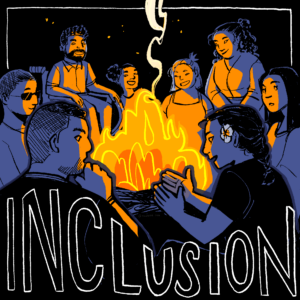Our vision is to see healthy, flourishing communities and empowered young people across the Pacific. This vision can only be fully realised when no one is left behind. By prioritising inclusivity, we can work towards a future where all individuals, regardless of their physical abilities or gender, have the opportunity to thrive.
In line with the transformative and ambitious goals of the 2030 Agenda for Sustainable Development (SDGs) to ‘leave no one behind,’ we emphasise that inclusivity must be at the heart of Australia’s efforts to address poverty, inequality, and climate change in the Pacific region.
Recognising Diversity and Inclusivity
We understand that factors such as gender, sexual orientation, age, ethnicity, disability, and other circumstances can significantly affect how individuals access, experience, and benefit from development policies and processes. True inclusion seeks to transform social structures and systems to ensure equal accessibility for all.
Women & Girls:
It is vital that women and girls are considered and included in decision making. Throughout our region, women face high levels of violence:
- 3 in 5 women have experienced violence.
- Women and girls with disabilities are 2-3 times more likely to experience violence.
- 1 in 4 adolescent girls have faced physical violence.
- 1 in 10 adolescent girls have suffered sexual violence.
It is crucial to include the experiences and insights of women and girls in decision-making and planning. As Matelita, a Pacific Diaspora delegate, states, “The role of women in decision making is important as they bring creativity to the table.”
People with Disabilities:
Approximately 1.7 million people in Pacific Island nations live with disabilities, making them some of the most marginalised members of their communities. They often face exclusion from essential services such as health care, education, assistive technology, social protection, and disability support services. This exclusion leads to higher levels of poverty, poor health, and social discrimination.
Australia’s policy and programming efforts with Pacific communities must be:
- Accessible: Ensuring infrastructure, information, communication, and technology are accessible to all.
- Participatory: Embracing the principle “nothing about us without us”; Australia must listen to and be guided by people with disabilities and other marginalised groups, ensuring everyone has the agency and dignity to be involved in development processes impacting their lives.
Nafi, a wheelchair user from Fiji, poignantly notes, “[Persons with Disabilities] are often forgotten when it comes to decision making and their rights are continuously violated and swept under the carpet endless times.”
REFLECTION by Ketia Toakarawa
PRAYER by Grace Tuiono
Thank you Lord, for you walk with us! We praise you for the breath of life, and for shaping us to be stronger and better everyday knowing our destiny lies within you. I pray for our communities and society that no one gets left behind because your ways will move mountains and shine through us whether we have disabilities or not.
It says in Philippians 4:11–13 ‘I can do all things through Christ which strengthens me.’ Lord, I pray that your light will give us strength, when we can’t find our strength in this world and that our faith will inspire others to come as who they are and create a better future for generations ahead.
ARTWORK by Rowena Seutatia MacDonald
